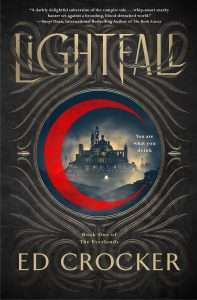Putting the Fangs into Fantasy: Why I Wrote my Book
In just three months as I write this, Lightfall, the first book in my epic fantasy trilogy The Everlands, will be loosed onto the world—I hope you like terrible jokes in your chapter headings, fantasy fans—and a question I’m sometimes asked is the following: why vampires and werewolves in fantasy?
The simple answer is that it sounds awesome, but the esteemed and depraved souls at Grimdark Magazine probably want an article not a paragraph, so I looked deep into myself (always an unwise move) and I came up with Terry Pratchett.
More specifically, Pratchett’s 24th Discworld book, The Fifth Elephant, which I’ll come back to.
But first, let’s check in with ten-year-old me, who is staying up late with his dad to watch one of his first 18-rated horror films, An Interview with the Vampire (dobbing my dad in but that’s fine, he won’t read this). Obviously it traumatised me and gave me nightmares (a fine foundation for any adult horror obsessive) but it put me firmly on the vampire bandwagon. Around the same time, I read The Lord of the Rings and A Wizard of Earthsea (yes, I was a precocious ten-year-old, yes you would have loathed me, yes you would have been correct).
So there I am, aged ten and already split hopelessly between horror and fantasy for life. Pity my future wallet. I am Legend and Salem’s Lot would solidify my vampire love, while all the usual SFF names of the late 90s and 2000s (dear Christ, us millennials are getting old) kept my teenage self on the fantasy path.
Now we return to The Fifth Elephant, which I read on release (do you remember how exciting a Discworld release was? Dopamine hits have never been the same). If you haven’t read it, stop reading this and immediately devour the City Watch sub-series of Discworld (in order, you maniac). In case you haven’t done that, let me terribly summarise: it features Vimes, the chief of police of a fantasy city, travelling to a nearby rural country called Uberwald, which is where the vampires or werewolves live. At first there as an ambassador, he soon discovers a conspiracy that could drive the region into war.
While there are some scary scenes—a tense bit where the eponymous Vimes is hunted by werewolves through the land and must outwit them is so good I completely cribbed it for my more werewolf-heavy Book 2 of my series, originality not being my strong suit—it’s the vampire and werewolf politics that grabbed me. The idea of a region where they co-exist and scheme against each other and other countries? Ever since then, I’ve not stopped thinking about it.

Ed Crocker, Image Credit to Julia Boggio
So much so that when I was a 27-year-old teacher and thoroughly hating my life (standard teacher mood) I recalled my desire to pick up on that idea and started writing the first book in a planned five-book saga on vampires, werewolves, sorcerers and, uh, nihilistic banshees (Actually, I abruptly quit my job first with no money in the bank, but that’s an entirely different story for a magazine called Stupid Young People Make Curious Decisions that Luckily Turn out Pretty Well.)
That series got zero interest—I’m still fond of it, and I miss my gloriously bizarre take on banshees, but some/all scenes have not aged well—so I wrote another book with vampires, werewolves and sorcerers in, and another… you get the point, which is that I’m a stubborn so-and-so who’s only ever had one idea. A decade after my offensively maverick “quit my job to be a novelist” decision, I finally get to force that idea onto the world whether it wants it or not.
But still the question remains: what is it about horror tropes that works well in fantasy? Well let me focus on vampires, who steal the show more than my werewolves, in Book 1 at least. For me there’s a lot of answers to that question, but two of the best are blood and immortality.
Let’s take blood first. Whether it’s seductive bloodsuckers putting the ro-mance into e-mancipating you from your life (if you liked that bomb of a joke, you’re going to love my book) or the kind of horrifically terrifying freaks from the graphic novel (and Josh Hartnett film triumph) 30 Days of Night, the timeless power of blood is arguably what gives the vampire legend its remarkable cultural staying power.
Blood is life, obviously, but blood is also sensuality, the dichotomy of pain and pleasure. What is a vampire romance if not an S&M bondage fest? As one of my characters remarks, though it is always painful to bleed, it is not always bad. Blood contains our soul in some readings; our very life essence. It carries disease, but it also saves. Vampires take your blood, but they give the dubious gift of eternity.
In my series, one of the angles by which I examine blood is the analogy of the poverty trap. In my vampire city, the poor get the weakest blood—I won’t go into too much detail, as the poor editor of this article is already smacking their head against the screen at the wordcount—and the rich get the best blood. So if you’re rich, you are strong and mentally sharp, and you never age. If you’re poor, you’re weak in both body and mind, and you die after a couple of centuries.
Often in our own society we are fooled by the idea we can “pull ourselves up by our bootstraps” to improve our lives. But if the very blood you drink (cough: diet, stress levels, exercise, sleep quality) is harming you through no fault of your own but the situation of your birth, how can you ever hope to fulfil this fairytale idea of class emancipation? Through such ideas can horror tropes exist in a complex political fantasy.
Then there’s the second reason I’m fascinated by the horror classics: immortality. I am obsessed by the idea of how a society would look if many of its denizens are centuries old. How does an economy or political ecosystem change if people have such long memories—and long-held grudges and hatreds? How is your personality affected by losing someone three centuries ago and having to face a near eternity of grief? Grief, as many of you will sadly know, never gets better. It just gets less frequent, but it still hits as hard, and knocks the wind right out of you until you remember how to breathe again, and, maybe, one day, be happy.
I’m not sure eternity is worth that, and neither are some of my characters.
So there we have it. Epic fantasy and the hammer horror classics might not be that frequent bedfellows, but there’s a world of intrigue to be had when they do get together.
And if not, I’ll just bring my nihilistic banshees back again.
Read Lightfall by Ed Crocker
The post Putting the Fangs into Fantasy: Why I Wrote my Book appeared first on Grimdark Magazine.




